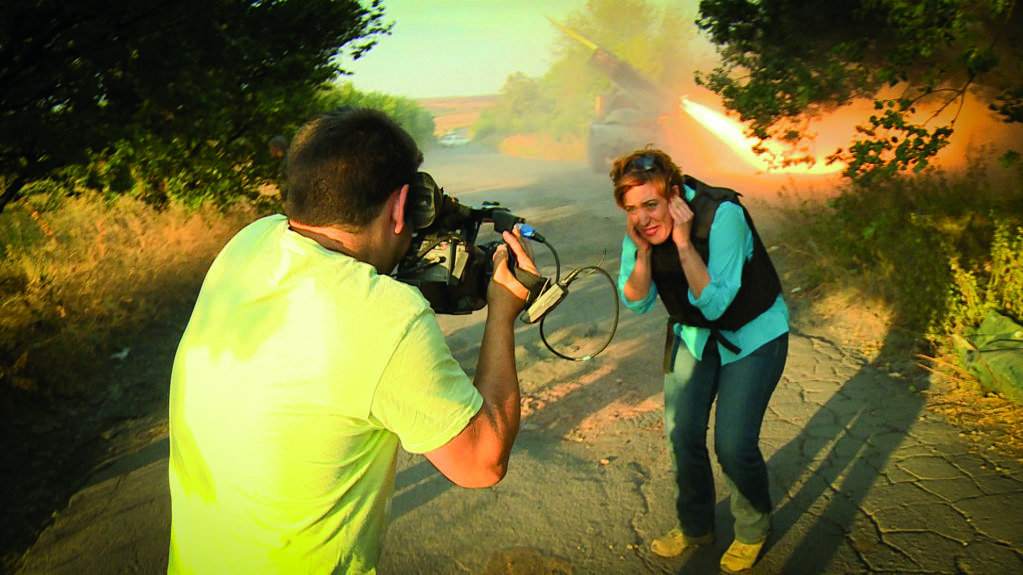Paula Slier, Middle East Bureau Chief for Russia Today and CEO and founder of Newshoundmedia, has worked in broadcasting for over 20 years as a foreign correspondent, anchor and news editor, and received numerous awards for her work. Her work has included reporting live under fire in Tripoli while Muammar Gadaffi’s forces were on the offensive, and crawling through a tunnel with Hamas smugglers in Gaza.

A TEFI-nominated (Russia’s highest television award) journalist for her reporting on Libya, she also reports from the frontline in Iraq, Ukraine, Syria, Afghanistan, Libya, Egypt, Gaza and Lebanon. Prior to reporting for Russia Today, she was senior assignment news editor and anchored breaking news and special events for SABC.
Q.Where are you now
[in November]?
- I am currently in Eastern Ukraine covering the battle between pro-Russian fighters and the Ukrainian military. [In October], I was on the Turkey-Syria border, 500 meters from the city of Kobane where Syrian Kurds are fighting with ISIS. Before that, I spent two weeks in Iraq embedded with the Peshmerga soldiers (Iraqi Kurds) on the frontline. I slept alongside them, outside behind their sandbags, to be woken up by US warplanes at three in the morning bombing ISIS positions nearby and the Peshmerga fighters’ firing shells a few kilometers into the distance. A highlight was spending time with the YPJ women fighters – some as young as 17 years old – who had given up school to fight ISIS.
- What plans for the new year? Where will you be?
- It’s impossible to say because I can get a call at any moment, even in the middle of the night, and be asked by my news editor to get on the next available flight to …and here the dots can be anywhere from Syria to Afghanistan to Egypt. The last time I took a holiday was a few months back. I’d gone to Thailand and was on the massage bed when the SMS came. Major fighting had broken out in Ukraine and I was asked if I could cut my holiday short and fly there immediately. As you can imagine I had the wrong clothing with me. I arrived in Ukraine with summer dresses, swimming costumes and sandals to cover a war. I had organized with the cameraman who met me in Ukraine to go past my home and pack warm, appropriate clothes for me, but he was stopped at airport security – not because he had bullet-proof jackets and helmets, but because he was traveling with women’s clothing!

- Are holidays not in the diaries of war correspondents?
- We like to pencil them in, but realistically we probably change the dates on average about four to five times for each trip. I’m supposed to take the rest of my Thailand holiday at the end of this month but I’m delaying booking the flights until the absolute last minute.
- As a female war reporter, are there any specific challenges?
- I’m often asked if I think being a woman aids or makes my job more difficult. I think it’s a mixture of both. On the one hand being female has helped me gain access to sources who might be more difficult to reach if I was a man. Especially in the Middle East, where many societies are quite patriarchal, women reporters often are seen as a third androgynous sex if you like – I get to sit with Taliban fighters and sip tea while their wives and daughters are in the other room. It feels like they don’t know what to do with me. But I’ve also interviewed Hamas leaders who don’t look directly at me when answering questions because I’m female. It was difficult covering the Egyptian protests in Tahrir Square as a woman. A few women journalists were raped and not-so-few were sexually assaulted and harassed, prompting ‘Reporters Without Borders’ to urge news organizations not to send women there. The association later amended their statement, warning rather that “security should be paramount”. Certainly some of the physical risks we face are greater than our male colleagues – although threats like kidnappings and intimidation are the same.
- What are the highs of war reporting?
- It’s a high to be on the cutting edge of news, to be at that spot on earth where all the world’s TV cameras are pointing, to be in the thick of history. I get to have experiences most people can only dream of – in the morning I could be interviewing street children, in the afternoon, I could be flying in a military helicopter and by evening, dining with a president. One of my favorite stories is when I was on foot patrol with US forces in Afghanistan and a group of children kept running after us. Much later, when we paused at a school for a few minutes, I took off my bullet-proof jacket and helmet and one of the boys, slightly aghast, came up to me and asked: “Ma’am, does your husband know you’ve left the house?”
